Who doesn’t want radiant, glowing skin? We all do! But achieving that luminous complexion isn’t just about genetics; it’s about having a consistent, well-thought-out skincare routine. A daily regimen tailored to your skin type using natural remedies can transform your skin from dull to dazzling, giving you that confidence boost you’ve always wanted.
Understanding Your Skin Type

Before diving into the nitty-gritty of skincare, it’s crucial to understand your skin type. This foundational knowledge is essential because it helps you choose natural ingredients that work best for you, ensuring you don’t inadvertently harm your skin. Each skin type has unique characteristics and needs, and using the wrong products can lead to irritation, breakouts, or other skin issues. By identifying your skin type, you can tailor your skincare routine to address specific concerns and enhance your skin’s natural beauty.
Identifying Your Skin Type
To determine your skin type, you can start by observing how your skin behaves throughout the day:
- Normal Skin: If your skin feels balanced—not too oily or too dry—you likely have normal skin. Normal skin has a smooth texture, small pores, and a healthy complexion with minimal blemishes.
- Oily Skin: If your skin tends to become shiny and greasy, especially in the T-zone (forehead, nose, and chin), you have oily skin. Oily skin often has larger pores and is more prone to blackheads, whiteheads, and acne.
- Dry Skin: If your skin feels tight, rough, or flaky, especially after washing, you have dry skin. Dry skin often appears dull and may show fine lines and rough patches.
- Combination Skin: If your skin exhibits characteristics of both oily and dry skin, with an oily T-zone but dry or normal cheeks, you have combination skin. This type requires a balanced approach to skincare.
- Sensitive Skin: If your skin reacts easily to products, environmental changes, or becomes red and irritated, you have sensitive skin. Sensitive skin needs gentle, soothing products to prevent irritation.
Tailoring Natural Remedies for Each Skin Type
Once you know your skin type, you can select natural ingredients that cater specifically to your skin’s needs:
- Normal Skin: Your skin is quite adaptable, so you can enjoy a variety of natural ingredients. Gentle cleansers like honey, light moisturizers such as jojoba oil, and regular exfoliation with ingredients like oatmeal can help maintain your skin’s balance.
- Oily Skin: Focus on ingredients that control excess oil and prevent acne without over-drying your skin. Aloe vera gel is excellent for hydration without greasiness, while witch hazel can help as a toner to tighten pores and reduce oiliness.
- Dry Skin: Hydration is key. Use creamy, nourishing cleansers like those made from honey or milk, and rich moisturizers such as avocado or coconut oil. Hydrating masks with ingredients like yogurt and honey can also provide deep moisture.
- Combination Skin: Balancing is essential. Use gentle, non-stripping cleansers like rose water, and light, non-comedogenic oils like grapeseed oil for moisturizing. Apply different products to different areas of your face if necessary (e.g., a lighter moisturizer in the T-zone and a richer one on your cheeks).
- Sensitive Skin: Opt for hypoallergenic and soothing ingredients. Chamomile extract and fragrance-free oils like argan oil are excellent choices. Always patch-test new products on a small area to ensure they don’t cause a reaction.
By understanding your skin type and using natural ingredients tailored to your specific needs, you can create a skincare routine that not only enhances your skin’s appearance but also promotes its overall health. This approach minimizes the risk of irritation and maximizes the benefits of each product you use, helping you achieve a radiant, glowing complexion naturally.
Essential Steps in a Daily Skincare Routine

Creating an effective daily skincare routine involves understanding the basic steps and the difference between morning and evening routines. This structured approach ensures your skin receives the care it needs at different times of the day, maximizing its health and appearance.
The Basics Of Skincare
To develop a robust skincare routine, it’s essential to incorporate the following fundamental steps:
1. Cleansing: Removes Dirt and Impurities Cleansing is the first and most crucial step in any skincare regimen. It removes dirt, oil, makeup, and environmental pollutants that accumulate on your skin throughout the day. A good cleanser ensures your pores remain unclogged and your skin can breathe, preventing breakouts and dullness. For natural cleansing, options like honey, which has antibacterial properties, or aloe vera, which soothes and cleanses, are excellent choices.
2. Toning: Balances the Skin’s pH and Prepares It for the Next Steps After cleansing, your skin’s pH balance can be disrupted. Toners help restore this balance, tightening pores and preparing your skin to absorb subsequent products more effectively. Natural toners such as rose water and witch hazel are great for hydrating and soothing the skin while maintaining its pH balance.
3. Moisturizing: Keeps the Skin Hydrated and Supple Moisturizing is vital for all skin types, as it helps maintain your skin’s moisture barrier, preventing dryness and irritation. Using natural moisturizers like jojoba oil or shea butter provides deep hydration and keeps your skin soft and supple. Proper moisturization also aids in smoothing out fine lines and maintaining a youthful complexion.
4. Sun Protection: Shields Your Skin from Harmful UV Rays Protecting your skin from the sun’s harmful ultraviolet (UV) rays is crucial to prevent premature aging, sunburn, and the risk of skin cancer. Natural sun protection can be achieved through ingredients like zinc oxide and carrot seed oil, which provide broad-spectrum UV protection without the harmful chemicals found in some commercial sunscreens.
Morning vs. Evening Routines
Morning: Focus on Protection and Hydration In the morning, your skincare routine should prepare your skin to face the day’s challenges, such as UV exposure and environmental pollutants. Here’s a typical morning routine:
- Cleanse: Use a gentle natural cleanser to start your day with a fresh face.
- Tone: Apply a natural toner to balance your skin’s pH and tighten pores.
- Moisturize: Use a light, hydrating moisturizer to keep your skin supple and soft.
- Sun Protection: Apply a natural sunscreen or sunblock to protect against UV damage.
The goal of the morning routine is to hydrate and protect your skin, ensuring it stays resilient and radiant throughout the day.
Evening: Emphasize Cleansing and Repairing In the evening, your skincare routine should focus on removing the day’s accumulation of dirt and pollutants and repairing the skin. Here’s a typical evening routine:
- Cleanse: Thoroughly cleanse your face to remove makeup, dirt, and oil.
- Tone: Use a natural toner to remove any leftover impurities and prepare your skin for further treatment.
- Moisturize: Apply a richer, more nourishing moisturizer or natural oil to hydrate and repair your skin overnight.
- Additional Treatments: This is the ideal time to apply any natural serums, treatments, or masks designed to address specific skin concerns, as your skin repairs itself while you sleep.
The evening routine aims to cleanse deeply and provide intensive hydration and nourishment, helping your skin recover and rejuvenate.
By understanding these basic steps and distinguishing between the needs of your skin in the morning and evening, you can create a comprehensive skincare routine that keeps your skin healthy, radiant, and glowing.
Step 1: Cleansing
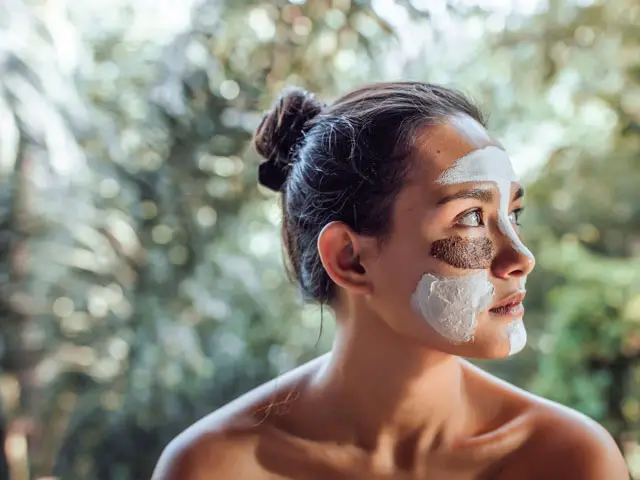
Cleansing is the cornerstone of any skincare routine. It removes dirt, oil, and makeup, preparing your skin for other products. Without proper cleansing, your pores can become clogged, leading to breakouts and dull skin. Using natural cleansers can effectively clean your skin while avoiding harsh chemicals that can cause irritation.
Importance of Cleansing
Cleansing your face is crucial because it helps remove the daily buildup of dirt, oil, and makeup that accumulates on your skin. This buildup can clog pores, leading to acne, blackheads, and other skin problems. Regular cleansing also removes dead skin cells, which can make your skin look dull and feel rough. By thoroughly cleansing your face, you create a clean slate that allows other skincare products, like moisturizers and serums, to penetrate your skin more effectively.
Natural Cleansers
Natural cleansers are gentle on the skin and free from harsh chemicals that can strip your skin of its natural oils. Here are some excellent natural cleansers:
Honey: Honey is a gentle antibacterial cleanser suitable for all skin types. It’s especially beneficial for acne-prone skin due to its antibacterial properties. Honey also helps to retain moisture, keeping your skin hydrated and soft.
Aloe Vera: Aloe vera soothes and cleanses the skin, making it great for sensitive and oily skin. It has anti-inflammatory properties that help calm irritated skin and can also aid in healing minor cuts and sunburns.
Oatmeal: Oatmeal acts as a gentle exfoliant and cleanser, ideal for dry and sensitive skin. It helps to remove dead skin cells and soothes irritation, leaving your skin smooth and refreshed.
How to Properly Cleanse Your Face
Proper cleansing involves a few simple steps to ensure your skin is thoroughly cleaned without being stripped of its natural moisture.
- Use Lukewarm Water to Wet Your Face: Lukewarm water is ideal as it helps to open your pores without causing irritation. Hot water can strip your skin of its natural oils, while cold water may not effectively remove all the impurities.
- Apply a Small Amount of Natural Cleanser and Gently Massage It in Circular Motions: Using a small amount of your chosen natural cleanser, gently massage it onto your skin using circular motions. This helps to stimulate blood circulation and ensures the cleanser reaches all areas of your face. Be gentle to avoid irritating your skin, especially if you have sensitive skin.
- Rinse Thoroughly and Pat Dry with a Clean Towel: Rinse your face thoroughly with lukewarm water to remove all traces of the cleanser. Pat your face dry with a clean, soft towel. Avoid rubbing your skin, as this can cause irritation and damage.
By following these steps and using natural cleansers, you can maintain a clean, healthy complexion. Cleansing is a vital part of your skincare routine, setting the foundation for other products to work effectively and helping you achieve radiant, glowing skin.
Step 2: Toning
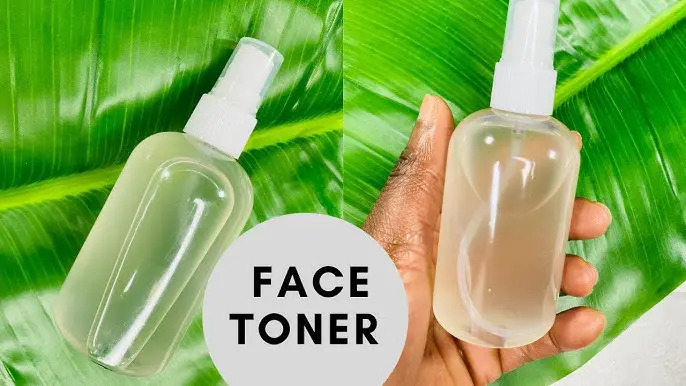
Toners are an essential step in any skincare routine, especially if you want to ensure your skin is thoroughly clean and well-prepared for subsequent products.
What Toners Do for Your Skin
Toners offer several benefits that contribute to your skin’s overall health and appearance:
1. Remove Residual Dirt After cleansing, some dirt, oil, and makeup residues can still linger on your skin. Toners help to remove these remaining impurities, ensuring your skin is completely clean.
2. Balance the Skin’s pH Cleansing can disrupt your skin’s natural pH balance, making it more alkaline. A toner helps to restore the skin’s natural acidic pH, which is essential for maintaining the skin’s barrier function and overall health.
3. Tighten Pores Toners help to tighten and minimize the appearance of pores, giving your skin a smoother and more refined look. This can help prevent dirt and bacteria from entering the pores and causing breakouts.
Natural Toners
Using natural toners can provide these benefits without the risk of irritating your skin with harsh chemicals. Here are some excellent natural options:
Rose Water: Hydrates and Soothes Rose water is known for its hydrating and soothing properties, making it suitable for all skin types. It helps to calm irritated skin, reduce redness, and provides a gentle refreshing feel. Rose water also has mild astringent properties that help to tighten pores.
Witch Hazel: Reduces Inflammation and Tightens Pores Witch hazel is a powerful natural astringent that can help to reduce inflammation and tighten pores. It is particularly beneficial for oily and acne-prone skin due to its ability to control excess oil production and reduce the appearance of blemishes.
Apple Cider Vinegar: Balances pH and Fights Bacteria Apple cider vinegar is an excellent natural toner that helps to balance the skin’s pH and has antibacterial properties. It can help to fight bacteria that cause acne and other skin issues. It’s best to dilute apple cider vinegar with water before use to prevent irritation, especially for those with sensitive skin.
Application Tips
Proper application of toner can maximize its benefits for your skin:
1. Apply Toner to a Cotton Pad and Gently Swipe Over Your Face Soak a cotton pad with your chosen natural toner and gently swipe it across your face, avoiding the eye area. This method helps to ensure even distribution and can effectively remove any remaining impurities.
2. Alternatively, Pat the Toner Directly Onto Your Skin with Your Hands Pour a small amount of toner into your hands and gently pat it onto your face. This method can be more hydrating and less wasteful than using a cotton pad. It also allows for better absorption of the toner into your skin.
Incorporating a toner into your daily skincare routine can significantly enhance the overall health and appearance of your skin. By choosing natural toners and applying them correctly, you can enjoy balanced, hydrated, and refined skin.
Step 3: Moisturizing
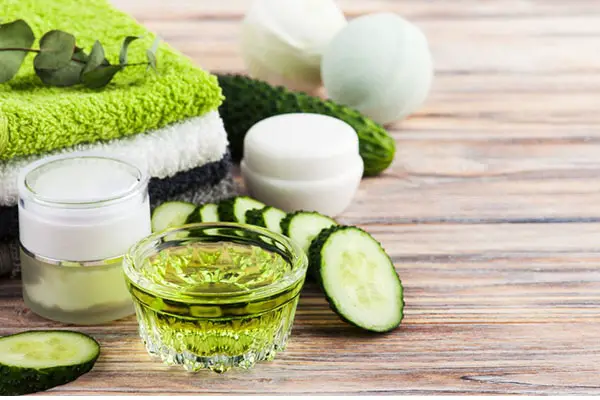
Moisturizing is essential to keep your skin hydrated, smooth, and protected. This step in your skincare routine ensures that your skin maintains its natural moisture balance and strengthens its barrier function, which is crucial for overall skin health.
Benefits of Moisturizing
A good moisturizer does more than just hydrate your skin. Here are the key benefits:
1. Prevents Dryness Moisturizers provide a protective layer that locks in moisture, preventing your skin from becoming dry and flaky. This is particularly important in harsh weather conditions or in environments with low humidity, where your skin can lose moisture more rapidly.
2. Protects Your Skin Barrier Your skin’s barrier is its first line of defense against environmental aggressors, including pollution, bacteria, and UV rays. Moisturizing helps to reinforce this barrier, making your skin more resilient and less prone to irritation and damage.
3. Improves Skin Texture Regular moisturizing can improve your skin’s texture, making it feel smoother and softer. Hydrated skin also appears more plump and youthful, reducing the appearance of fine lines and wrinkles.
Natural Moisturizers
Choosing natural moisturizers can provide these benefits without exposing your skin to potentially harmful chemicals. Here are some effective natural options:
Coconut Oil: Deeply Hydrates Coconut oil is renowned for its deep hydrating properties. It’s rich in fatty acids that nourish and moisturize the skin, making it ideal for dry skin types. Coconut oil also has antimicrobial properties that can help protect your skin from bacteria and fungi.
Jojoba Oil: Balances Oil Production Jojoba oil closely resembles the natural oils (sebum) produced by your skin, making it suitable for all skin types. It helps balance oil production, which is beneficial for both dry and oily skin. Jojoba oil is also non-comedogenic, meaning it won’t clog your pores.
Shea Butter: Rich and Nourishing Shea butter is a deeply nourishing moisturizer that is perfect for very dry skin. It’s rich in vitamins A and E, which help to soothe and heal the skin. Shea butter also provides a protective barrier that locks in moisture and keeps your skin hydrated for longer periods.
Best Practices for Moisturizing
To get the most out of your moisturizing routine, follow these best practices:
1. Apply Moisturizer While Your Skin Is Still Damp After cleansing and toning, your skin is more receptive to absorbing moisture. Applying moisturizer while your skin is still damp helps to lock in hydration, ensuring your skin stays soft and supple.
2. Use a Different Moisturizer for Day and Night Your skin’s needs can vary throughout the day and night, so it’s beneficial to use different moisturizers:
- Daytime Moisturizer: Opt for a lighter, fast-absorbing oil such as jojoba oil or a moisturizer with natural SPF protection like carrot seed oil. This helps to hydrate your skin without leaving it greasy and prepares it to face the day’s environmental challenges.
- Nighttime Moisturizer: Use a richer oil or butter, such as coconut oil or shea butter, to deeply nourish and repair your skin while you sleep. Nighttime is when your skin undergoes its natural repair processes, so providing extra nourishment can enhance these effects.
By incorporating these natural moisturizers and following these best practices, you can maintain a healthy, hydrated, and radiant complexion. Moisturizing is a critical step in any skincare routine, and choosing the right natural ingredients can make a significant difference in the overall health and appearance of your skin.
Step 4: Sun Protection

Sunscreen is a non-negotiable step in your daily skincare routine. Protecting your skin from the sun’s harmful UV rays is essential for maintaining healthy skin and preventing long-term damage.
Importance of SPF
Sun protection is crucial for several reasons:
1. Prevents Premature Aging Exposure to UV rays accelerates the aging process of your skin, leading to wrinkles, fine lines, and age spots. Regular use of sunscreen helps to prevent these signs of premature aging, keeping your skin looking youthful and vibrant.
2. Prevents Sunburn Sunburn not only causes immediate pain and discomfort but also damages the DNA in your skin cells, which can lead to long-term health issues. Using sunscreen prevents sunburn by blocking harmful UV rays from penetrating your skin.
3. Reduces the Risk of Skin Cancer Prolonged exposure to UV radiation significantly increases the risk of developing skin cancer, including melanoma, the most serious type. Consistent use of sunscreen reduces this risk by providing a protective barrier against these harmful rays.
Natural Sun Protection
For those who prefer natural alternatives to traditional sunscreens, there are several effective options:
Zinc Oxide: A Natural Mineral That Provides Broad-Spectrum Protection Zinc oxide is a physical sunscreen that sits on top of the skin and reflects UV rays. It provides broad-spectrum protection against both UVA and UVB rays. Zinc oxide is gentle on the skin and is often used in formulations for sensitive skin, including products for babies.
Carrot Seed Oil: Contains Natural SPF Properties Carrot seed oil has natural SPF properties, though it is not a replacement for traditional sunscreen. It contains antioxidants and vitamins that nourish the skin while providing some level of UV protection. Carrot seed oil can be used in combination with other natural sun protectors for added benefits.
Red Raspberry Seed Oil: High in Antioxidants and Offers Some UV Protection Red raspberry seed oil is rich in antioxidants and offers some UV protection, particularly against UVB rays. It also has anti-inflammatory properties that can help soothe the skin. Like carrot seed oil, it should be used in conjunction with other sun protection methods.
How to Apply Natural Sun Protectors
Proper application of natural sun protectors ensures maximum effectiveness:
1. Apply Generously to All Exposed Skin To ensure adequate protection, apply a generous amount of the natural sun protector to all exposed areas of your skin. Make sure to cover commonly missed spots such as the ears, back of the neck, and tops of the feet.
2. Reapply Every Two Hours, Especially If You’re Outdoors or Sweating Natural sun protectors, like all sunscreens, need to be reapplied every two hours to maintain their effectiveness. If you are swimming, sweating, or towel-drying, reapply more frequently to ensure continuous protection.
By incorporating natural sun protectors into your skincare routine, you can protect your skin from harmful UV rays while using ingredients that are gentle and safe. Remember, sun protection is a crucial step in preventing premature aging, sunburn, and reducing the risk of skin cancer, making it an indispensable part of your daily skincare regimen.
Additional Steps for Enhanced Skincare
incorporating additional steps like natural exfoliation, serums, treatments, masks, and peels can significantly enhance your skin’s health and appearance. These extra steps can address specific skin concerns and provide deeper care.
Natural Exfoliation

Natural exfoliants are gentle on the skin and avoid harsh chemicals, making them a great choice for maintaining healthy, radiant skin. Here’s how you can incorporate natural exfoliation into your skincare routine:
1. Sugar Scrubs

Recipe: Mix sugar with honey or oil.
Benefits:
- Gentle Physical Exfoliation: The granules in sugar act as a mild abrasive, effectively removing dead skin cells without being too harsh on the skin.
- Antibacterial Properties: Honey adds antibacterial benefits, which can help in preventing breakouts and keeping the skin clear.
- Moisture and Hydration: Oils like coconut or olive oil provide deep hydration, leaving the skin feeling soft and smooth. They also help to restore the skin’s natural barrier.
How to Use:
- Mix equal parts of sugar and honey or oil to create a thick paste.
- Gently massage the scrub onto your face in circular motions, avoiding the delicate eye area.
- Rinse off with warm water and pat your skin dry.
2. Oatmeal Scrubs
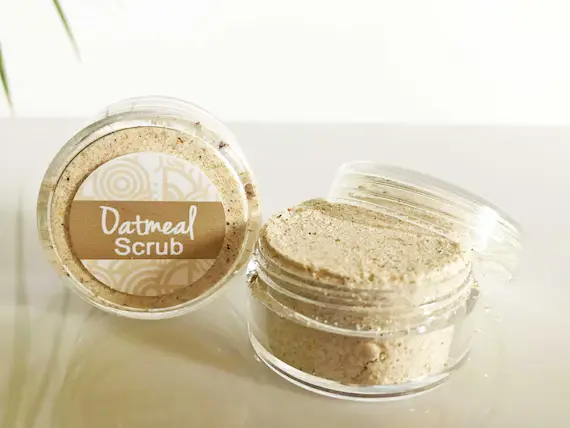
Recipe: Combine oatmeal with yogurt.
Benefits:
- Gentle Exfoliation: Oatmeal acts as a soft, gentle exfoliant that is perfect for sensitive skin. It removes dead skin cells without causing irritation.
- Soothing Properties: Oatmeal has anti-inflammatory properties that help soothe irritated or inflamed skin, making it ideal for those with sensitive or reactive skin types.
- Brightening Effect: Yogurt contains lactic acid, a natural alpha-hydroxy acid (AHA), which helps to exfoliate the skin and brighten the complexion.
How to Use:
- Mix finely ground oatmeal with plain yogurt to form a paste.
- Apply the mixture to your face and gently massage it in circular motions.
- Leave it on for a few minutes before rinsing off with warm water.
3. Coffee Grounds
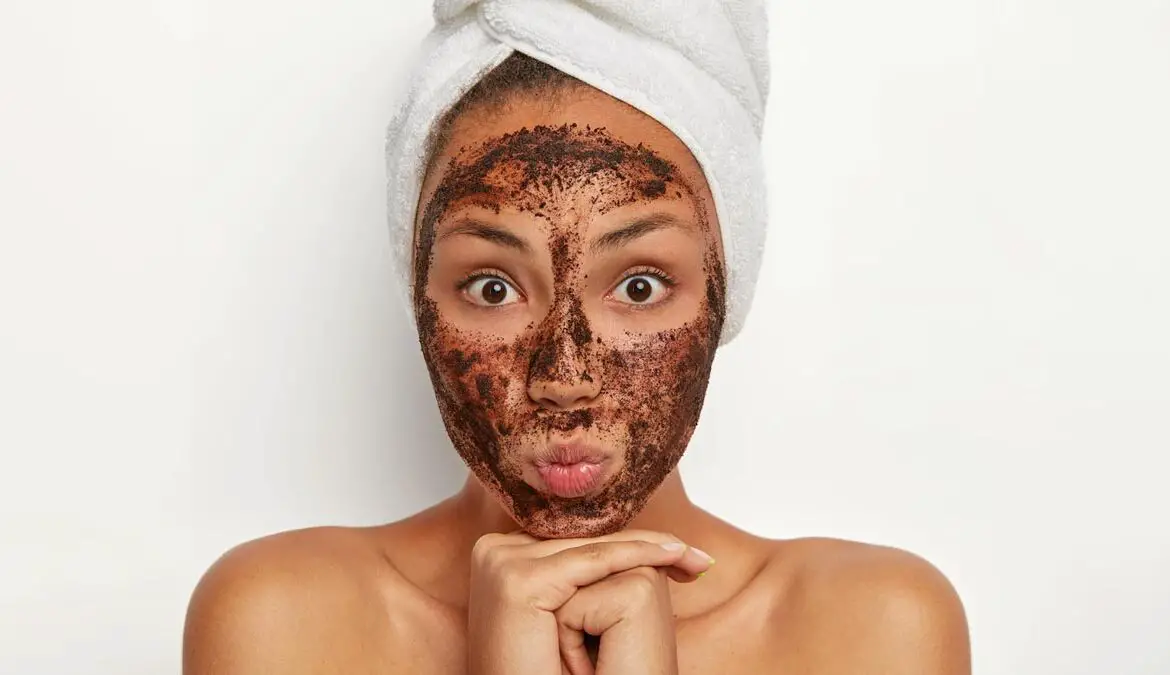
Recipe: Mix coffee grounds with coconut oil.
Benefits:
- Exfoliation and Circulation: Coffee grounds help to exfoliate the skin and improve blood circulation, which can give your skin a healthy, radiant glow.
- Antioxidant Properties: Coffee is rich in antioxidants that help to fight free radicals and protect the skin from environmental damage.
- Hydration: Coconut oil provides deep hydration and nourishment, leaving the skin feeling soft and supple.
How to Use:
- Combine used coffee grounds with coconut oil to create a paste.
- Gently massage the scrub onto your face in circular motions, focusing on areas that need more exfoliation.
- Rinse off with warm water and enjoy your refreshed, glowing skin.
Incorporating natural exfoliants like sugar, oatmeal, and coffee grounds into your skincare routine can help maintain healthy, glowing skin. These natural ingredients are gentle yet effective, avoiding the harsh chemicals often found in commercial exfoliants. Regular exfoliation with these natural scrubs will remove dead skin cells, promote cell renewal, and leave your skin looking brighter and more radiant.
Natural Serums and Treatments
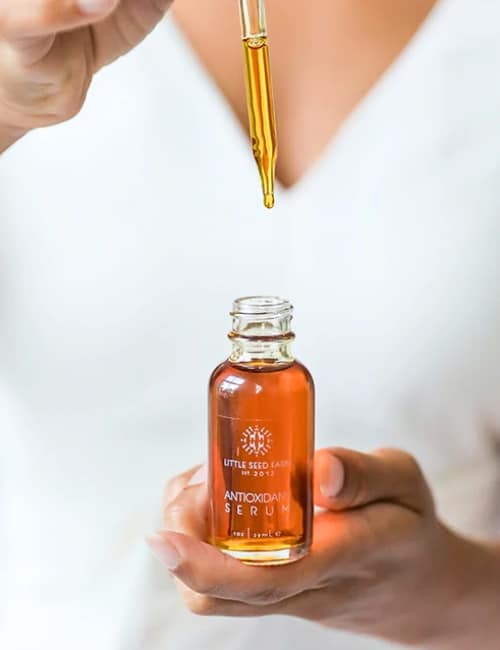
Serums and treatments are concentrated formulations that target specific skin issues, delivering potent ingredients directly to the skin. Natural options can be highly effective and gentle, offering numerous benefits without the harsh chemicals often found in commercial products. Here’s a closer look at some top natural serums and treatments:
1. Aloe Vera Gel
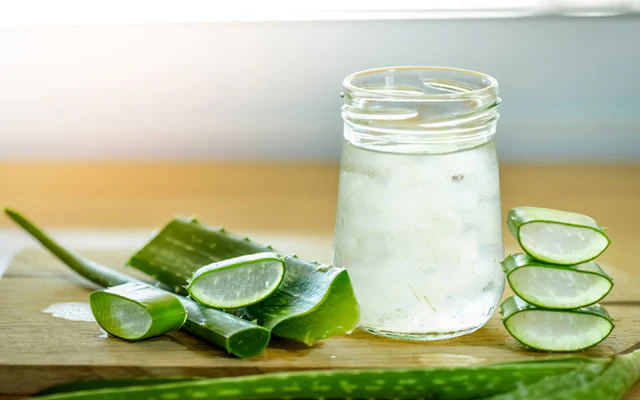
Aloe vera gel is a versatile and soothing natural treatment that can address various skin concerns. Here’s an in-depth look at why it’s such a popular choice in skincare:
Soothes and Heals
Aloe vera is renowned for its soothing properties, making it ideal for treating sunburns, irritation, and minor cuts. Its anti-inflammatory effects help calm the skin and reduce redness and swelling. When applied to sunburned skin, aloe vera provides a cooling sensation that can alleviate the pain and discomfort associated with sunburn. It also accelerates the healing process by promoting the regeneration of skin cells.
Hydrates
Aloe vera is composed mainly of water, which provides deep hydration without leaving a greasy residue. This makes it suitable for all skin types, including oily and combination skin. It penetrates the skin easily, delivering moisture to dry areas and helping to restore the skin’s natural barrier. Unlike heavy creams, aloe vera gel feels light on the skin and does not clog pores, making it an excellent moisturizer for acne-prone skin as well.
Cooling Effect
The cooling sensation of aloe vera gel provides immediate relief for hot or inflamed skin, making it a favorite for sunburn relief. This cooling effect is due to the gel’s high water content and natural compounds that soothe irritated skin. It’s not just beneficial for sunburns; it can also provide comfort for skin that is hot or inflamed due to conditions like rosacea or eczema.
Rich in Nutrients
Aloe vera contains a wealth of vitamins, enzymes, and amino acids that nourish the skin and promote healing. It is rich in vitamins A, C, and E, which are antioxidants that help to protect the skin from free radical damage. Enzymes in aloe vera, such as catalase and amylase, aid in breaking down dead skin cells and promote new cell growth. Amino acids, the building blocks of proteins, help to repair and maintain healthy skin.
How to Use Aloe Vera Gel
For Sunburn Relief:
- Apply a generous amount of aloe vera gel directly to the sunburned area.
- Reapply as needed to keep the skin hydrated and cool.
As a Moisturizer:
- Use aloe vera gel as a daily moisturizer after cleansing your face.
- Apply a thin layer to your skin and let it absorb completely before applying sunscreen or makeup.
For Minor Cuts and Irritations:
- Clean the affected area thoroughly.
- Apply aloe vera gel to the cut or irritated skin and cover with a bandage if necessary.
In Face Masks:
- Mix aloe vera gel with other natural ingredients like honey or oatmeal to create a soothing face mask.
- Apply the mask to your face, leave it on for 15-20 minutes, and then rinse off with warm water.
Aloe vera gel is an essential component of any natural skincare routine due to its multifaceted benefits. Its ability to soothe and heal, provide deep hydration, offer a cooling effect, and nourish the skin with essential nutrients makes it a valuable ingredient for addressing various skin concerns. Whether you’re dealing with sunburn, dryness, irritation, or simply looking for a gentle moisturizer, aloe vera gel is a natural, effective solution that supports overall skin health.
2. Vitamin E Oil

Vitamin E oil is a powerful antioxidant with multiple skin benefits, making it a popular ingredient in skincare routines. Here’s a detailed look at how it can enhance your skin health:
Repairs and Moisturizes
Vitamin E oil deeply moisturizes the skin, helping to repair and strengthen the skin barrier. It’s especially beneficial for dry and damaged skin. This oil is thick and rich, providing intense hydration that helps to lock in moisture and prevent dryness. By reinforcing the skin barrier, it protects the skin from environmental aggressors and reduces the risk of irritation and infection.
Heals Scars
Vitamin E is known for its ability to speed up the healing process of scars and wounds by promoting cell regeneration and improving skin elasticity. Applying vitamin E oil to scars can help to soften the tissue and reduce their appearance over time. Its regenerative properties stimulate the production of new skin cells, which can help to replace damaged tissue and improve the overall texture and tone of the skin.
Reduces Fine Lines
Regular use of vitamin E oil can help reduce the appearance of fine lines and wrinkles. This is thanks to its ability to support collagen production and skin cell renewal. Collagen is a protein that gives skin its structure and firmness. By boosting collagen production, vitamin E oil helps to maintain the skin’s elasticity and smooth out fine lines, resulting in a more youthful appearance.
Protects Against Environmental Damage
As an antioxidant, vitamin E neutralizes free radicals caused by UV exposure and pollution, protecting the skin from oxidative stress and preventing premature aging. Free radicals are unstable molecules that can damage cells, leading to signs of aging such as wrinkles, fine lines, and dark spots. By scavenging these free radicals, vitamin E oil helps to protect the skin from this damage, keeping it looking healthier and younger for longer.
How to Use Vitamin E Oil
As a Moisturizer:
- Apply a few drops of vitamin E oil to your face and neck after cleansing and toning.
- Massage gently in upward circular motions until fully absorbed.
- Use it as a night treatment to allow it to work while you sleep.
For Scar Treatment:
- Apply a small amount of vitamin E oil directly to the scarred area.
- Gently massage the oil into the skin in circular motions for a few minutes.
- Repeat this process daily for best results.
For Fine Lines and Wrinkles:
- Mix a few drops of vitamin E oil with your regular moisturizer or use it on its own.
- Apply to areas prone to fine lines and wrinkles, such as around the eyes and mouth.
- Use consistently for several weeks to see improvements.
As an Antioxidant Protector:
- Incorporate vitamin E oil into your morning skincare routine.
- Apply it before your sunscreen to boost its protective effects against environmental damage.
- Ensure you use a broad-spectrum SPF during the day to protect from UV rays.
Vitamin E oil is a potent antioxidant that offers numerous benefits for the skin. Its ability to repair and moisturize, heal scars, reduce fine lines, and protect against environmental damage makes it an invaluable addition to any skincare regimen. By incorporating vitamin E oil into your daily routine, you can enhance your skin’s health, resilience, and youthful appearance.
3. Tea Tree Oil
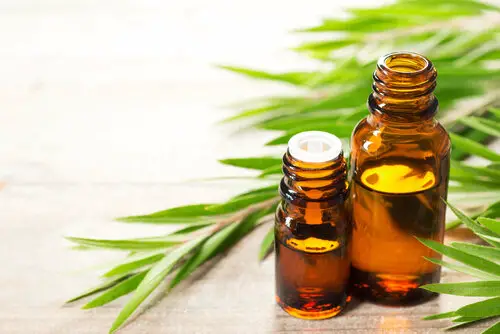
Tea tree oil is a potent natural treatment, particularly effective for acne-prone skin. Its unique properties make it a versatile and powerful addition to any skincare routine aimed at combating acne and maintaining clear skin. Here’s an in-depth look at the benefits of tea tree oil:
Antibacterial Properties
Tea tree oil has strong antibacterial properties that help to eliminate acne-causing bacteria, reducing the occurrence of breakouts. Acne is often caused by the bacteria Propionibacterium acnes, which thrives in clogged pores. The antibacterial compounds in tea tree oil, such as terpinen-4-ol, can penetrate the skin and kill these bacteria, preventing new pimples from forming and helping existing acne to heal faster.
Anti-inflammatory Effects
The anti-inflammatory properties of tea tree oil help to reduce redness, swelling, and inflammation associated with acne and blemishes, providing relief and promoting faster healing. When applied to inflamed skin, tea tree oil can soothe irritation and calm the skin, which not only makes acne less noticeable but also more comfortable. This is particularly beneficial for cystic acne, which tends to be more painful and swollen than other types.
Reduces Oiliness
Tea tree oil helps to balance the skin’s oil production, making it less oily and less prone to clogged pores. Overproduction of sebum, the skin’s natural oil, can lead to oily skin and contribute to acne formation. By regulating sebum production, tea tree oil can help to keep the skin less greasy and reduce the likelihood of clogged pores and blackheads.
Natural Alternative
For those looking for a natural alternative to harsh chemical acne treatments, tea tree oil is a gentle yet effective option. Many commercial acne treatments contain strong chemicals like benzoyl peroxide and salicylic acid, which can cause dryness, peeling, and irritation, especially in sensitive skin. Tea tree oil offers a more natural approach that can be just as effective without the adverse side effects, making it suitable for long-term use.
How to Use Tea Tree Oil
As a Spot Treatment:
- Dilute tea tree oil with a carrier oil (such as jojoba or coconut oil) at a 1:10 ratio (1 part tea tree oil to 10 parts carrier oil).
- Use a cotton swab to apply the diluted oil directly to individual pimples.
- Leave it on overnight and rinse off in the morning.
In a Facial Toner:
- Add a few drops of tea tree oil to a toner base, such as witch hazel or distilled water.
- Apply the toner to your face using a cotton pad after cleansing.
- This helps to treat and prevent breakouts while toning the skin.
As Part of a Face Mask:
- Mix a few drops of tea tree oil with honey or aloe vera gel to create a soothing face mask.
- Apply the mask to your face and leave it on for 15-20 minutes before rinsing off with warm water.
- Use this mask once or twice a week to maintain clear skin.
In a Moisturizer:
- Add a couple of drops of tea tree oil to your regular moisturizer.
- Apply it to your face as you normally would to incorporate the antibacterial benefits into your daily routine.
Tea tree oil is an exceptional natural treatment for acne-prone skin, offering antibacterial, anti-inflammatory, and oil-regulating benefits. It provides a gentle alternative to harsh chemical treatments, making it a versatile addition to any skincare routine aimed at achieving and maintaining clear, healthy skin. Whether used as a spot treatment, in a toner, a face mask, or added to a moisturizer, tea tree oil can help to combat acne and improve the overall appearance and health of your skin.
How to Use Natural Serums and Treatments
Application Tips:
- Aloe Vera Gel: Apply a thin layer of pure aloe vera gel to the affected areas or use it as a soothing mask. Leave it on for 15-20 minutes before rinsing off or let it absorb into the skin.
- Vitamin E Oil: Use a few drops of vitamin E oil directly on scars, fine lines, or dry patches. You can also mix it with your regular moisturizer for added hydration and protection.
- Tea Tree Oil: Due to its potency, tea tree oil should be diluted with a carrier oil (like jojoba or coconut oil) before applying to the skin. Use a cotton swab to apply the diluted oil directly to blemishes or mix it into your moisturizer for overall use.
Natural Masks and Peels
Masks and peels provide intensive treatment, addressing various skin concerns from hydration to detoxification.
1. Avocado and Honey Mask
- Recipe: Mash avocado and mix with honey.
- Benefits: Avocado is rich in healthy fats and vitamins that deeply moisturize and nourish the skin. Honey adds hydration and antibacterial benefits. This mask is perfect for dry and sensitive skin.
2. Clay Masks
- Types: Bentonite or kaolin clay.
- Benefits: Clay masks are excellent for detoxifying the skin, drawing out impurities, and reducing oiliness. Bentonite clay is known for its strong detoxifying properties, while kaolin clay is gentler and suitable for sensitive skin.
3. Yogurt and Turmeric Mask
- Recipe: Mix yogurt with a pinch of turmeric.
- Benefits: Yogurt contains lactic acid, which gently exfoliates and brightens the skin. Turmeric has anti-inflammatory and brightening properties that help even out skin tone and reduce pigmentation.
Incorporating these natural steps into your skincare routine can elevate your regimen and address specific skin needs. Natural exfoliants like sugar, oatmeal, and coffee grounds help to remove dead skin cells and promote a healthy glow. Serums and treatments such as aloe vera gel, vitamin E oil, and tea tree oil target specific concerns like hydration, repair, and acne. Natural masks and peels, including avocado and honey masks, clay masks, and yogurt and turmeric masks, provide intensive care for various skin types and conditions.
Skincare Tips for Different Skin Concerns
Oily Skin
- Balance oil production with witch hazel toner.
- Use light oils like jojoba and aloe vera gel.
Sensitive Skin
- Stick to hypoallergenic natural products like chamomile extract.
- Test new products on a small area first.
Incorporating Healthy Habits for Better Skin
Good skincare isn’t just about the products you use; it’s also about your lifestyle.
Diet and Hydration
- Eat a balanced diet rich in fruits and vegetables.
- Drink plenty of water to keep your skin hydrated from within.
Sleep and Stress Management
- Aim for 7-9 hours of sleep per night.
- Practice stress-reducing activities like meditation or yoga.
Avoiding Harmful Habits
- Don’t smoke, and limit alcohol consumption.
- Avoid excessive sun exposure and tanning beds.
Choosing the Right Natural Skincare Ingredients
Navigating the myriad of skincare products can be daunting. Here’s how to choose wisely.
Reading Labels and Ingredients
- Look for natural and organic certifications.
- Avoid harmful chemicals like parabens, sulfates, and artificial fragrances.
Recommended Natural Ingredients
- Aloe Vera: Healing and soothing.
- Coconut Oil: Deeply moisturizing.
- Shea Butter: Rich and nourishing.
DIY Skincare Recipes
Creating your own skincare products can be fun and effective.
Natural Cleansers
- Honey and Lemon Cleanser: Mix honey with a few drops of lemon juice.
- Oatmeal and Milk Cleanser: Blend oatmeal with milk for a soothing cleanser.
Homemade Masks
- Avocado and Honey Mask: Mash avocado and mix with honey.
- Turmeric and Yogurt Mask: Combine turmeric powder with yogurt.
Simple Exfoliants
- Sugar and Honey Scrub: Mix sugar with honey for a gentle scrub.
- Coffee and Coconut Oil Scrub: Combine coffee grounds with coconut oil.
Common Skincare Mistakes to Avoid
Avoid these common pitfalls to keep your skin healthy.
Over-Washing
- Strips your skin of natural oils.
- Stick to cleansing twice a day.
Skipping SPF
- Leaves your skin vulnerable to UV damage.
- Always use a natural sun protector.
Using Too Many Products
- Can irritate and overwhelm your skin.
- Stick to a simple, consistent routine.
Tracking Your Skincare Progress
Keeping track of your skincare journey helps you understand what works best.
Keeping a Skincare Journal
- Note down the products you use and any reactions.
- Track improvements and setbacks.
Adjusting Your Routine as Needed
- Listen to your skin and adjust based on its needs.
- Don’t be afraid to tweak your routine.
When to Consult a Dermatologist
- If you have persistent skin issues.
- For professional advice on serious concerns.
Achieving radiant, glowing skin with natural remedies is not only possible but highly rewarding. By understanding your skin type and following a consistent daily routine with natural ingredients, you can transform your complexion and boost your confidence. Start small, stay consistent, and watch your skin flourish.
Frequently Asked Questions
How long does it take to see results from a new skincare routine? Typically, it can take about 4-6 weeks to see noticeable changes in your skin.
Can I skip steps in my skincare routine if I’m in a hurry? While it’s best to follow all steps, you can simplify by sticking to cleansing, moisturizing, and sun protection.
How do I deal with breakouts when starting a new skincare routine? Introduce new products gradually and stick with it for a few weeks to see if your skin adjusts. Use natural spot treatments like tea tree oil for breakouts.
Is it necessary to use expensive products for effective skincare? No, many natural and affordable ingredients can be just as effective as high-end products.
How often should I update my skincare routine? Reevaluate your routine every few months or as your skin’s needs change due to factors like season or lifestyle changes.

